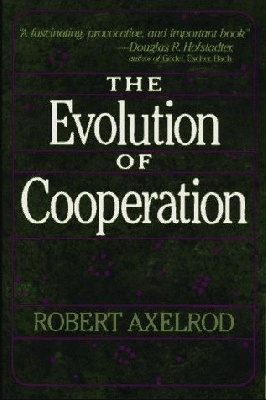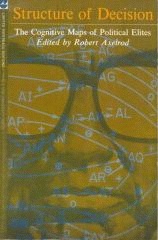 Robert Axelrod
Robert Axelrod
 Robert Axelrod
Robert Axelrod
US-amerikanischer Politikwissenschaftler, Vertreter des Liberalismus, Entscheidungstheoretiker, Spieltheoretiker
* 27.05.1943
Werdegang
1964: B.A. der Mathematik an der University of Chicago in Chicago, Illinois
1966: M.A. in Politikwissenschaft an der Yale University in New Haven, Connecticut
1969: Ph.D. in Politikwissenschaft an der Yale University in New Haven, Connecticut
1969-1974: Assistenz-Professur der Politikwissenschaft an der University of California in Berkeley, Kalifornien
1974-1980: Außerordentliche Professur der Politikwissenschaft an der University of Michigan in Ann Arbor, Michigan
1980-1987: Professur der Politikwissenschaft und Public Policy am Department of Political Science and Institute of Public Policy Studies an der University of Michigan in Ann Arbor, Michigan
seit 1989: Arthur W. Bromage Distinguished University Professur der Politikwissenschaft und Public Policy an der University of Michigan in Ann Arbor, Michigan
Beratertätigkeiten bei den Vereinten Nationen, der Weltbank und dem Pentagon
1976-1981: Editorial Board der "American Political Science Review”
1980-1983: National Academy of Sciences Panel on Behavioral and Social Aspects of Energy Consumption and Production
1985-1991: National Academy of Sciences Committee on Contributions of Behavioral
and Social Science to the Prevention of Nuclear War
1988-1991: National Academy of Sciences Committee on International Security and Arms Control
2003-2004: Rat der American Political Science Association
2004-2005: Vize-Präsident der American Political Science Association
seit 2005: Council for a Community of Democracies
2006-2007: Präsident der American Political Science Association
1990: National Academy of Sciences Award for Behavioral Research Relevant to the Prevention of Nuclear War
1999: Excellence in Research Award, College of Literature Science and the Arts, University of Michigan
2003-2006: NSF Award für den Aufsatz “Agent-Based Models of In-Group Favoritism and Out-Group Hostility”
2003-2006: NSF IGERT Award für den Aufsatz “Institutions, Diversity, Emergence, Adaptations and Structures” (gemeinsam mit Scott E. Page, Carl P. Simon, Michael D. Cohen und Thomas B. Kepler)
2006: Ehrendoktorwürde der Georgetown University in Washington, D.C.
2006-2007: NSF Award für den Aufsatz “Best Practices for Interdisciplinarity" (gemeinsam mit Michael Brintnall)
Bücher:
Conflict of Interest: A Theory of Divergent Goals with Applications to Politics. Chicago: Markham 1970.
Framework for a General Theory of Cognition and Choice. Berkeley: University of California 1972.
The Evolution of Cooperation. New York: Basic Books 1984. (deutsch:
Die Evolution der Kooperation. München: Oldenbourg Verlag 1987.
The Complexity of Cooperation: Agent-Based Models of Competition and Collaboration. Princeton, NJ: Princeton University Press 1997.
mit Michael D. Cohen
Harnessing Complexity: Organizational Implications of a Scientific Frontier. New York: Free Press 2000.
Herausgeberschaften:
 The Structure of Decision: The Cognitive Maps of Political Elites. Princeton, NJ: Princeton University Press 1976.
The Structure of Decision: The Cognitive Maps of Political Elites. Princeton, NJ: Princeton University Press 1976.
Perspectives on Deterrence. New York: Oxford 1989.
The Structure of Public Opinion on Policy Issues. In: Public Opinion Quarterly 31.1967, 1. S. 51-60.
Conflict of Interest: An Axiomatic Approach. In: Journal of Conflict Resolution 11.1967, 1. S. 87-99.
Bureaucratic Decision Making in the Military Assistant Program: Some Empirical Findings. In: RAND Corporation, October 1968, RM-5528-PR/ISA.
Where the Votes Come From: An Analysis of Electoral Coalitions,
1952-1968. In: American Political Science Review 66.1972, 1. S. 11-20.
Schema Theory: An Information Processing Model of Perception and Cognition. In: American Political Science Review 67.1973, 4. S. 1248-1266.
Argumentation in Foreign Policy Settings: Britain in 1918, Munich in 1938 and Japan in 1970. In: Journal of Conflict Resolution 21.1977, 4. S. 727-756.
A Coalition Theory Based on Conflict of Interest. In: Evan, William M. (Hrsg.): Inter-Organizational Relations. Harmondsworth: England Penguin 1976. S. 44-54.
The Rational Timing of Surprise. In: World Politics 31.1979, 2. S. 228-246.
Effective Choice in the Prisoner's Dilemma. In: Journal of Conflict Resolution 24.1980, 1. S. 3-25.
mit William Hamilton
The Evolution of Cooperation. In: Science 211. March 1981. S. 1390-1396.
The Emergence of Cooperation Among Egoists. In: American Political Science Review 75.1981, 2. S. 306-318.
mit William Zimmerman
The Soviet Press on Soviet Foreign Policy: A Usually Reliable Source.
In: British Journal of Political Science 11.1981, 2. S. 183-200.
mit William Zimmerman
The "Lessons" of Vietnam and Soviet Foreign Policy. In: World Politics 34.1981, 1. S. 1-24.
mit Michael D. Cohen
Coping with Complexity: The Adaptive Value of Changing Utility. In: American Economic Review 74.1984, 1. S. 30-42.
mit Robert O. Keohane
Achieving Cooperation Unter Anarchy: Strategies and Institutions. In: World Politics 38.1985, 1. S. 226-254.
Tips for an Academic Job Talk. PS Political Science and Politics 18.1985, 3. S. 612-613.
Presidential Election Coalitions in 1984. In: American Political Science Review 80.1986, 1. S. 281-284.
An Evolutionary Approach to Norms. In: American Political Science Review 80.1986, 4. S. 1095-111.
mit Douglas Dion
The Further Evolution of Cooperation . In: Science 242.1988 (9. December 1988). S. 1385-1390.
The Concept of Stability in the Context of Conventional War in Europe. In: Journal of Peace Research 27.1990, 3. S. 247-254.
Building a Strong Legislature: The Western Experience. In: PS Political Science and Politics 24.1991, 3. S. 474-478.
mit D. Scott Bennett
A Landscape Theory of Aggregation. In: British Journal of Political Science 23.1993, 2. S. 211-233.
mit Jianzhong Wu
How to Cope with Noise in the Iterated Prisoner's Dilemma In: Journal of Conflict Resolution 39.1995, 1. S. 183-189.
The Dissemination of Culture: A Model with Local Convergence and Global
Polarization. In: Journal of Conflict Resolution 41.1997, 2. S. 203-226.
mit D. Scott Bennett
Response to Galam's Comment. In: British Journal of Political Science 28.1998, 2. S. 412-414.
Kunz, Volker: Robert Axelrod, The Evolution of Cooperation. In: Kailitz, Steffen (Hrsg.): Schlüsselwerke der Politikwissenschaft. Wiesbaden: VS Verlag 2007. S. 23-27.
Webseite von Robert Axelrod an der University of Michigan (u. a. mit der Möglichkeit zum Download verschiedener Aufsätze)
SG